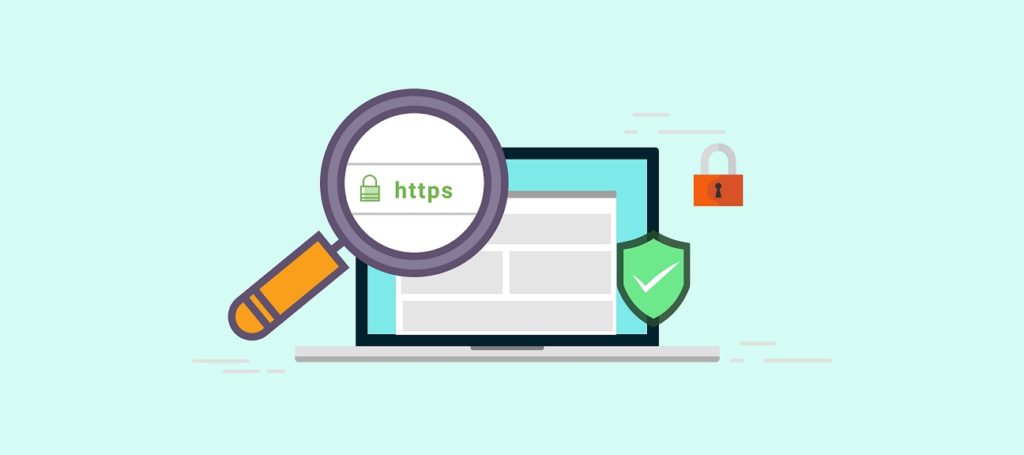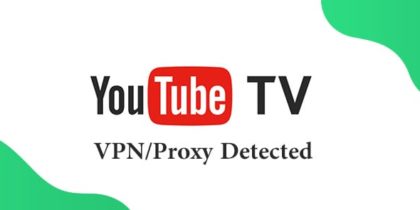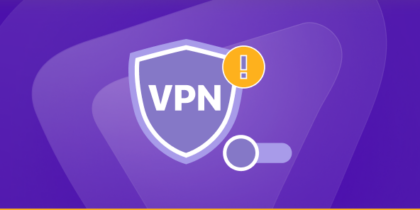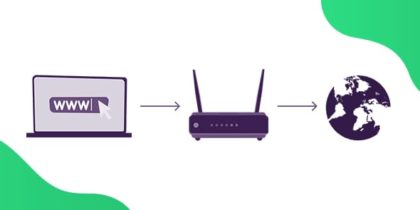When it comes to staying safe online, both VPN and HTTPS play crucial roles, but they’re not the same. You’ve probably noticed the padlock icon in your browser or heard about VPNs protecting your privacy, but which one actually offers better security?
Understanding how each works helps you make smarter choices about your online protection. Here, we’re going to highlight what a VPN and HTTPS is as well as what distinguishes one from the other. So, let’s get started:
What is VPN?
A VPN (Virtual Private Network) is a security tool that encrypts your internet traffic and routes it through a remote server, masking your IP address and online identity. This prevents ISPs, hackers, and trackers from seeing your real location or monitoring your online activities.
In simple terms, a VPN creates a private tunnel between your device and the internet. It secures all types of traffic, from browsers and apps to file transfers.
What is HTTPS?
HTTPS (Hypertext Transfer Protocol Secure) is a protocol used to securely transmit data between your browser and a website. It uses SSL/TLS encryption to protect sensitive information like passwords and credit card details from being intercepted.

Essentially, HTTPS ensures that the communication between your device and the website’s server remains private and tamper-proof. However, HTTPS only protects the website connection, not your entire internet activity.
HTTP vs. HTTPS: What’s the difference?
When it comes to staying safe online, both VPN and HTTPS play importnat roles, but they serve different purposes. An SSL/TLS certificate is the main difference between HTTP and HTTPS.
So, HTTPS is essentially HTTP but with added security. While HTTP leaves your data exposed to ISPs, hackers, and trackers, HTTPS encrypts your connection for safer browsing. In this VPN vs. HTTPS comparison, let’s explore which one offers better online protection and privacy.
VPN vs. HTTPS: Key Differences
| Feature | VPN | HTTPS |
|---|---|---|
| Full Form | Virtual Private Network | Hypertext Transfer Protocol Secure |
| Function | Encrypts and routes all internet traffic through a secure tunnel | Encrypts communication between a browser and a specific website |
| Scope of Protection | Entire device (apps, browsers, background services) | Only the website connection in a browser |
| Encryption Type | Network-level encryption | Application-level (SSL/TLS) encryption |
| IP Address Protection | VPN Hides your IP address from websites and ISPs | Does not hide your IP address |
| Anonymity | Provides online anonymity by masking identity | Does not offer anonymity |
| Bypassing Geo-Restrictions | Can unblock region-locked websites and services | Cannot bypass geo-restrictions |
| Who Can See Your Activity | Neither ISPs nor network admins | ISPs can still see which sites you visit |
| Use Case | Secure browsing, streaming, remote work, and public Wi-Fi protection | Safe online transactions and secure login forms |
| Example Indicator | VPN app connected icon | Padlock icon (🔒) in browser address bar |
Why do I need a VPN if I already use HTTPS websites?
HTTPS only encrypts the connection between your browser and a specific website, protecting data like passwords or credit card details from being intercepted. A VPN, however, encrypts all your internet traffic, regardless of the app or site, ensuring privacy from ISPs, trackers, and public Wi-Fi threats.
In detail, HTTPS protects communication on individual websites but doesn’t hide your IP address or browsing activity from your ISP or government agencies. A VPN masks your real IP and routes your traffic through secure servers, shielding all apps, browsers, and services from external monitoring or profiling.
This added layer of encryption makes VPNs essential for full-scale online privacy beyond what HTTPS provides. While HTTP leaves your data exposed to ISPs, hackers, and trackers, HTTPS encrypts your connection and, when used alongside a VPN vs. HTTPS setup, provides stronger overall privacy.
Are VPNs necessary if I already use HTTPS websites?
Yes, VPNs are still necessary even if you use HTTPS. While HTTPS secures the data exchanged between you and a website, it doesn’t anonymize your identity or protect you from location tracking. A VPN does both by encrypting your entire internet traffic and hiding your IP address.
HTTPS can’t prevent ISPs, governments, or network administrators from seeing which websites you visit, it only encrypts the page content. A VPN ensures that even this metadata stays hidden, making it impossible for outsiders to trace your online behavior. It also protects apps and non-browser traffic, offering complete security across all your devices and connections.
Does VPN encrypt all internet traffic or just browsers?
A VPN encrypts all internet traffic on your device, not just what passes through browsers. This includes data from apps, games, file transfers, and background connections that don’t rely on HTTPS.
Unlike HTTPS, which protects communication only between browsers and specific sites, VPN encryption works at the network level. It secures every data packet before it leaves your device, ensuring that all traffic, browser or otherwise, remains encrypted and unreadable to anyone trying to intercept it. This makes VPNs far more comprehensive for privacy and data security.
What’s the difference between SSL and VPN encryption?
SSL (or its successor TLS) encryption protects data between your browser and a specific website, while VPN encryption secures all traffic between your device and the VPN server. SSL is application-level, while VPN encryption is network-level.
In essence, SSL/TLS (used in HTTPS) only shields browser sessions, leaving other internet activity potentially exposed. VPN encryption, however, establishes an encrypted tunnel that protects every connection, whether from browsers, apps, or background services. This broader coverage is why VPN encryption provides more complete privacy and protection than SSL alone.
Also Read: Paid VPN vs Free VPN: 6 Reasons Why Paid VPN is Better
What HTTPS Cannot Do?
As mentioned earlier, HTTPS ensures secure communication over the internet by encrypting data between your browser and websites. However, there are limitations compared to VPNs:
- Hide Your IP Address: HTTPS doesn’t mask your IP address. Websites and your ISP can still see your IP and location, whereas a VPN hides your IP, making your online presence more anonymous.
- Encrypt All Internet Traffic: HTTPS only secures data between your browser and websites. A VPN encrypts all your internet traffic, including apps and services outside your browser.
- Bypass Geo-Restrictions: HTTPS doesn’t change your IP location, so it can’t access geo-restricted content. VPNs can make it appear as if you’re accessing the internet from a different location, bypassing these restrictions.
- Prevent ISP Tracking: Your ISP can still see which sites you visit with HTTPS, they just can’t see the exact content. A VPN encrypts all your traffic, preventing ISPs from tracking your web activities.
- Secure Remote Access: HTTPS doesn’t provide access to private networks. VPNs allow you to securely connect to remote networks, like your office network, as if you were physically there.
Why is VPN Necessary?
Both VPNs and HTTPS are two different things, but their objective is the same: to make your online experience more secure. Therefore, VPN vs. HTTPS makes no sense as they’re not direct substitutes for each other.
While you could just use a VPN and avoid visiting HTTP websites altogether, it’s a safer bet to stick to HTTPS-protected sites and use a VPN as well. Besides, this will considerably reduce the risk of your data getting compromised.
Then, one must also consider the fact that HTTPS doesn’t help with accessing the Internet without any limitations – it can’t be used to conceal your identity with an anonymous IP address. In this scenario, a VPN is your best friend.
PureVPN – The Most Reliable VPN
If you’re looking to buy a VPN service worth your time and money, then PureVPN has got you covered. We always have your back and take your online experience to the next level with:
- The fastest growing VPN network of more than 6500 servers and over 300,000 IPs in 88+ countries worldwide.
- Easy-to-use VPN apps for all major desktop and mobile platforms, including Android, iOS, Windows, Mac, and Linux.
- A suite of features like Split Tunneling, DNS Leak Protection, Internet Kill Switch, and WebRTC Leak Protection.
- Excellent support for Netflix, Amazon Prime, Hulu, BBC iPlayer, and 50+ other streaming websites.
- No caps on bandwidth so that you have the freedom to stream, download, and browse as much as you want.
- 10 simultaneous logins for your household – why buy multiple VPN accounts when you can secure all your devices with just one?
Why Do You Need VPN + HTTPS?
Using a VPN in conjunction with HTTPS is a great idea, and here are some reasons why:
- To Improve Data Security: While HTTPS ensures that the data between your browser and the website is encrypted, a VPN adds an additional layer by encrypting your entire internet connection. This dual encryption provides robust protection against eavesdropping and cyberattacks like man-in-the-middle.
- To Enhance Online Anonymity: HTTPS doesn’t hide your IP address or browsing activities from your ISP or other entities. By combining it with a VPN, you mask your IP address and make your online actions virtually untraceable, safeguarding your online privacy.
- To Dodge Geo-restrictions: VPNs allow you to change your virtual location, helping you access content that might be blocked or restricted in your country. HTTPS does not offer such capabilities – it merely encrypts the data transfers between your browser and websites.
Frequently Asked Questions
No. A VPN cannot see the contents of your HTTPS traffic due to HTTPS’s end-to-end encryption. It can only see the destination (for example, website address) but not the data exchanged.
Yes, a VPN encrypts your internet traffic, providing a secure tunnel between your device and the VPN server. This encryption helps protect your data from being intercepted or viewed by third parties like your ISP or hackers.
Yes, you can use VPN and HTTPS together for maximum protection. HTTPS secures website data, while a VPN encrypts all traffic and hides your IP.
VPN encryption covers all network traffic, while HTTPS only secures browser connections. Both use strong encryption, but VPN offers wider protection.
Yes, a VPN encrypts all internet traffic, including data from non-HTTPS sites, keeping it safe from interception.
Yes, websites can still track you through cookies and IP addresses even with HTTPS. A VPN hides your IP to reduce tracking.
A VPN offers better overall privacy since it encrypts all traffic and hides your identity, while HTTPS only secures website connections.
No, HTTPS doesn’t hide your IP address. Only a VPN masks your IP to keep your online identity private.
No, HTTPS alone isn’t enough. It secures website data but doesn’t protect all traffic or hide your browsing activity.
Yes, your ISP can still see which websites you visit with HTTPS, but a VPN hides both your activity and destination sites.
A VPN works with all apps and services on your device, while HTTPS only secures data exchanged through web browsers.
Wrapping Things Up
To sum things up, HTTPS is a great first step when it comes to making sure your data isn’t snooped on by unauthorized parties, and a VPN is necessary for those who value security and want to enjoy the borderless Internet. It’s not about whether HTTPS or VPN is the ideal choice – the two work well together as if the match was made in cyber heaven itself!










lets say i am connected to the VPN server shopping on Amazon. WHAT protocol is used from the VPN server to Amazon? is it another VPN connection or HTTPS. and if it is HTTPS then WHY do i need a VPN connection when i can connect to Amazon in HTTPS myself